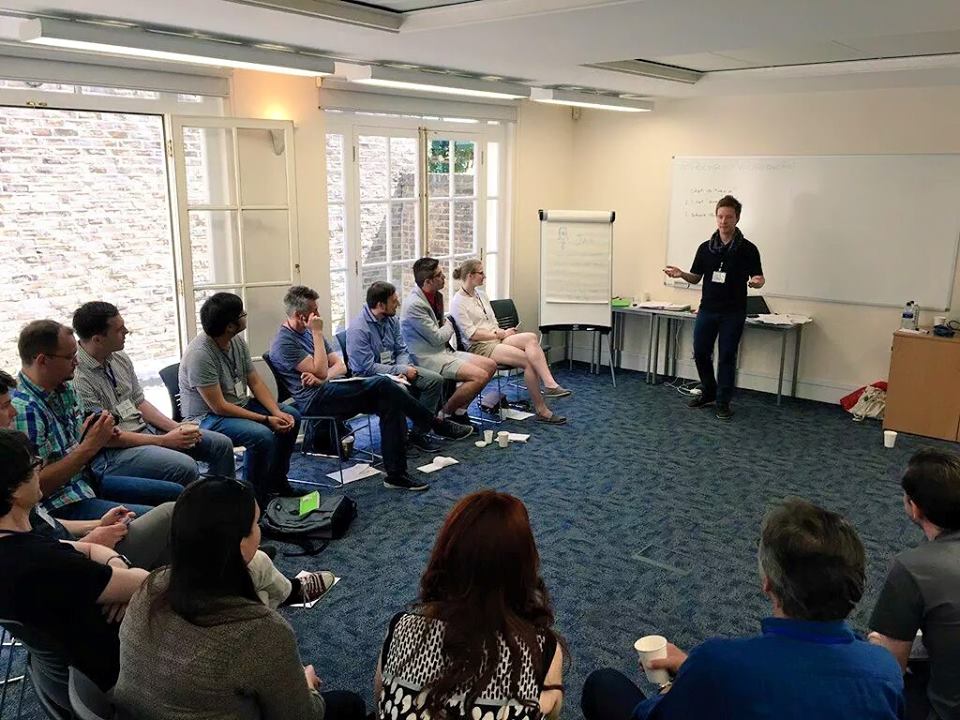
It's the language learning question I get asked most often.
It comes up again and again on the podcast.
And no matter how often we discuss it, it keeps coming back.
Can you learn two languages at once?
There's something about the romance of learning two languages at the same time that people seem unwilling to let go of.
So, in this article, I'm going to share my thoughts on the topic, and give you some advice on how to learn two languages at once in as effective a way as possible.
By the way, whether or not you want to learn one language at a time or you're studying two languages at once, using the right method is also key.
My courses teach you through StoryLearning®, a fun and effective method that gets you fluent thanks to stories, not rules. Find out more and claim your free 7-day trial of the course of your choice.
Is it Good to Learn Two Languages at Once?
You probably remember a time in your life when you thought learning a foreign language was too hard.
But one day, things changed.
Things didn't look as bleak anymore.
You had a breakthrough in your language learning and saw how it was possible to learn not only one language but many more, should you wish.
We've all caught the language bug at some point, and quickly started to entertain fantasies of learning multiple languages.
If I work hard, I can learn as many languages as I want!
Learning lots of languages is a noble aspiration, and can enhance your life beyond anything you thought possible. (It certainly did for me.)
So, what's the secret?
Can You Learn Two Languages at Once?
One of the first things we have to do in order to untangle the question “can I learn two languages at once?” is to separate out the ideas of:
- Being able to speak multiple languages
- Learning multiple languages at the same time
Success in language learning tends to be sequential. Of my many multilingual friends, in every case I can think of, they learnt their languages sequentially – one after the other.
Usually over many years.
They did not learn their languages at the same time.
This can be a sobering thought if you're just getting started and have the aspiration to learn many languages, but it's important to understand for your future success.
Those who have learnt many languages will typically have
- Had success learning their first foreign language (either through skill or circumstance)
- Become aware of an approach that works well for them
- Repeated that process again for future languages
- Often designed their lifestyle to aid that process
- And kept it up for years
It does not happen by accident.
So appearances may be deceptive, and speaking multiple languages does not necessarily mean learning more than one language at a time.
Indeed, when I ask successful language learners “can you learn multiple languages at once?”, the answer is almost always an emphatic: No.
But why?
Why do successful language learners tend to advise against learning two languages at once?
After all, it is clearly possible to study two (or three, or four) languages at once – you could go down to your local bookshop, buy some books, and dedicate 30 minutes each a day to four languages.
Well, the basis of the argument against learning multiple languages at once is that it will ultimately be quicker to learn them sequentially.
So the first thing we need to understand is: What are the key elements to learning one language efficiently?
Learning A Language Quickly
There are many factors that help you learn a language quickly, but the areas most relevant to this discussion are:
1) Depth Of Focus

The process of acquiring a new language is unpredictable.
You never know how steep the learning curve will be, or what difficulties you might run up against.
The best you can do is to create the right conditions for you to learn, and that involves creating a state of deep focus, over a period of many months.
With deep focus, and many hours of exposure, your brain begins to make sense of the language in an instinctive way, and it makes it more likely for epiphanies to happen.
2) Routine
Creating a regular study routine is perhaps the biggest challenge of all.
With consistency, you can overcome any language problem, and your brain gets used to your pattern of learning.
With a haphazard (or non-existent) routine, you're constantly battling the clock and elevating your stress levels, which are horrible conditions for learning. Just ask the inconsistency villain!
3) Willpower
Life is never simple, and your motivation to study every day goes in ebbs and flows.
Everyone has bad days (even bad weeks), but when you have one single purpose, or object of study (e.g. to learn French), at least you know what you have to do to get back on the horse after an unproductive period.
4) Immersion
You can't just study a language, you have to get used to it.
That takes time a lot of time.
Many hours spent with the language.
The more you can immerse yourself in the language in your downtime with TV, radio, books etc, the faster you will learn as your brain simply has more opportunities to form connections.
That's why I created the StoryLearning® method – so that you can immerse yourself in stories, which motivates you to keep coming back to the language.
5) Developing A Persona
Learning to speak a language well involves developing a persona in the language, which comes both from a lot of listening and interacting extensively with native speakers.
This can take a long time but ultimately manifests itself in a persona, body language, and an accent in the language that makes native speakers comfortable to be around you.
Learning how to control these factors is what leads to the ability to learn a new language efficiently.
But as you can see, it's not easy!
So, what happens when you introduce a second language into the mix?

Learning Two Languages At Once
When you decide to learn two languages at the same time, the most obvious effect is that you will have less time to study overall.
It's so obvious that it barely needs pointing out.
However, it's relevant here because it's actually not the main issue.
Is learning two languages at once bad? No, but the main effect of learning more than one language at once is that you immediately compromise all the factors we just talked about, that are essential parts of the language learning process.
This means that, although you may well be able to find the time to learn both languages, you will most likely lose all the key ingredients that would have allowed you to learn either of them effectively on their own:
- Depth of focus – When you divide your attention between two languages, you lose the crucial depth of focus that allows you to learn quickly.
- Routine – That daily routine, which is so hard to get right at the best of times, suddenly got twice as hard. Keeping up an effective study schedule with multiple languages over the long term is extremely hard.
- Willpower – When you inevitably lose your way, or suffer from a loss of motivation, the task of getting back on the horse is twice as hard. When the going gets tough with one language, you'll probably find yourself making excuses to spend more time with the other. Not a problem, you may say, but jumping from one language to the other can quickly become a way of avoiding dealing with the real hard work that's necessary to make progress.
- Immersion – With two languages to contend with, immersing yourself in either becomes less effective.
- Developing a persona – The process of developing a persona in another language – a consequence of all your other efforts around focus and immersion is made that much harder with two!
If learning a foreign language were just a question of memorising words and putting them together with grammar rules, it might be straightforward enough to learn many languages at the same time.
But it's not.
Your success in learning a language over the long-term is accounted for just as much by your emotional intelligence, self-control, interpersonal skills, etc, as by your aptitude for language, or your ability to learn rules.
You can't have one without the other.
Now, it is certainly true that expert language learners develop strategies for coping with more than one language.
But it's only once they have such a strong command of the learning process that they can start to control it with a degree of dexterity, and also recognise the danger signs when they emerge and correct course without wasting months in the process.
How to Maximise Chances Of Success When You Want to Learn Two Languages At Once
I get it.
You've fallen in love with two languages, and really can't bear the thought of abandoning either of them. Maybe you even want to learn three languages at once!
Or maybe life happened and you suddenly have the need to learn a new language, through choice or necessity.
In fact, it happened to me recently.
In August, despite my long-term project to learn Cantonese, I had a strong desire to travel and do something new.

(It can be very constructive to take a break from a language for the right reasons.)
I went to Thailand for two weeks and studied Thai intensively. I even documented the experience with daily videos.
Although I thought it would be a short diversion – a bit of fun – I ended up falling for the language more than I expected and wasn't willing to let it go when I returned to London.
So, as I speak, I'm actively learning two languages at the same time: Thai and Cantonese, and thinking deeply about making the process as efficient as possible.
Based on this experience, and many other years of experimentation, here is my advice for overcoming all the drawbacks of learning two languages at the same time, and making the most of the experience:
Make One Language Your Primary Focus
- Aim to spend 80% of your time on one language – yes, this means you have to choose!
For all intents and purposes, this will be your primary language where you will spend most of your time, place your focus, and prioritise over the other.
Make the other language secondary
- Aim to spend 20% of your time on the other language.
You'll be spending much less time on this language, in order to create focus and depth for your primary language.
Let me illustrate this with an example.
In my case, Cantonese is currently my primary language. It's what I study every morning in my core study time, it's what I listen to in my dead time, it's what I practise reading and writing, the language I watch on TV and practise speaking whenever I can.
It's a good 80% of my week and my main focus.
However, I also keep up my Thai, but in a very controlled way:
- I have a 1-hour lesson every Friday
- My teacher sets homework, which I complete once or twice a week
That's basically it.
I don't currently have many opportunities to speak Thai, but if I do, I might throw the odd language exchange into the mix.
The two strategies serve different purposes
- With Cantonese, I'm playing the “study hard” game. I'm actively working hard on it, trying to push it forward as much as possible on a daily basis.
- I feel like I'm learning it in some depth, and with focus. With the Thai, I'm playing the “long game”.
I know that time does so much of the work in a language. And simply by keeping it up over many months, albeit a small number of hours weekly, I will end up making slow but steady progress, and most importantly, not lose it.
The hardest part of this combination is knowing that I'm not doing much Thai. But I try to remember lessons learnt in the past about the importance of time, and a low-stress environment. And I try as hard as I can to enjoy the experience of learning in a no-pressure way. (Makes a nice change!)
It's also no coincidence that the proportions of this language mix follow the 80-20 rule, which I've written about before.
Here are some more important ideas to bear in mind:
- Reverse the 80/20 mix periodically – In order to satisfy your desire to learn both languages, you can swap the two over from time to time to make the other language your primary. How often should you do this? It's very hard to say, but I quite like time frames of 3-4 months.
- Choose two languages from different families – To the extent that you have a choice in the matter (your heart often doesn't allow it!), you'll be doing yourself a favour if you choose to study languages from different families. Spanish and Italian, for example, are so close that you will often find yourself confusing the two. (See here for how to avoid confusing similar languages.) Far from helping, you'll find the proximity between the two languages prevents you from learning either with any clarity. You would probably find the pairing of Spanish and Japanese, for example, far easier, as it would help you compartmentalise the two languages in your separate study time.
- Try different study methods – This is a less important point, but something I'm experimenting with. In Cantonese, I'm focusing on speaking, reading, and listening. In Thai, however, I'm trying something different, and focusing mostly on reading. There are a couple of reasons for this. Firstly, the small amount of time I have available for Thai is probably better spent with a narrow focus. Secondly, it's a totally different mode of studying than with Cantonese.
- Lastly, not being in Thailand, I'll probably have more opportunities to read than to speak in the near future, so it's a good bet to learn to read. Either way, separating my study methods between the two languages is a further way of keeping them separate, and I'm quite enjoying it.
Can You Learn Two Languages At The Same Time?

Is it hard to learn two languages at once? It's certainly a challenge.
I believe that, for the most part, success in language learning comes from learning one language at a time. But when all is said and done, it's not about collecting languages.
It's about enjoying and enriching your life.
And if two languages are the path to enrichment for you, then go for it!
Follow the advice in this article and I believe you'll be putting yourself in the best position to move further and faster in your two languages.
Can you learn two languages at once? What are your thoughts on this? I'd love you to prove me wrong!








































